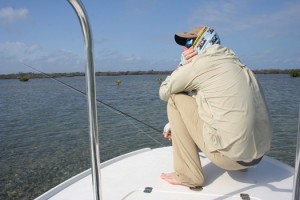
Photo by Matt Hansen… me, seconds after losing a really, really nice fish.
Well… want to get a little depressed?
Here’s a story about netting in Long Island… that’s bonefish netting. This makes me grumpy. I have to say, I didn’t see any netting there when I was there, but, Courntey did.
One of Mr Knowles’s recent guests, Courtney-Marie Martin, writing in the Internet-based fishing blog, skinnywaterculture.com, said of her Long Island experience: “I witnessed first-hand one of the major conservation issues currently going on in the area, with gill netters present not far from the flat we just fished.
#“My heart broke. If we don’t preserve what little we have left, this will all be gone, and there will be no future generation to follow in our footsteps. This is apparently an on-going, don’t ask don’t tell, problem on the island. With a heavy heart, and the thought of bonefish being gill netted, along with other innocents by catch, we headed in.”
If that’s not enough, there are some who think the decline in bonefish in the Keys may have something to do with commercial netting in Cuba. That’s what this article puts forward.
We do not know the exact correlation between the bonefish in the Keys and the fish in Cuba, but we do know that about fifteen years ago, there was massive netting projects going on in the north part of Cuba, gill nets that stretched miles across the flats and channels. From reports the Bonefish and Tarpon Trust has heard, thousands and thousand of bonefish, along with countless other species were netted and sold at market. At about this same time, the bonefish population suddenly plummeted in the Florida Keys.
And why do I keep bringing stuff like this up?
“We have reached the time in the life of the planet and humanities demands upon it when every fisherman will have to be a river keeper, a steward of marine shallows and a watchman on the high seas. We are beyond having to put back what we have taken out. We must put back more than we take out. We must make holy war on the enemies of aquatic life as we have gillnetters, polluters and drainers of wetlands. Otherwise, as you have already learned, these creatures will continue to disappear at an alarming rate. We will lose as much as we have already lost already and there will be next to nothing, remnant populations, put-and-take, dim bulbs following the tank truck.” –Tom McGuane writing in the Some Remarks section of his outstanding book The Longest Silence.
- If you liked the story above, check out these stories below
- Kauai Bonefish Netting (0.809)
- The Freeport News - Gill nets concern West End fishermen (0.809)
- Bahamas 5-0 (0.809)
Tags: Cuba, Florida, Long Island, netting




All over this world it seems that any kind of mass collection process usually results in detrimental effects. From burning acres of rainforest to clear cut logging to shooting thousands of bison from a train to netting fish (of any species). On the positive side, when we have recognized the danger and stopped netting, Mother Nature can usually recover. Consider the redfish rebound in Florida once netting was banned.
It leaves me a little more than grumpy. I see it almost everyday here on Aitutaki and it is pretty tough when you have a guest out fishing with you and people pull up and start laying nets out. When you come and pay good money to fish an exotic location the last thing you want to see are your target species getting thrown into sacks. It’s legal here so nothing I say or do has or will change the way they want to do things. We all have to just keep up the good fight.
No different here in Hawaii, yesterday we find an illegal net with 20-30 dead bonefish that had been there for a few days. What a bummer that these 6-10 year old bonefish are being killed indiscriminately and left to rot. The political disposition in the islands is apathetic toward any enforcement yet we promote our islands and tourism industry based on these resources.
Puerto Rico is starting grass roots efforts to ban gill netting!